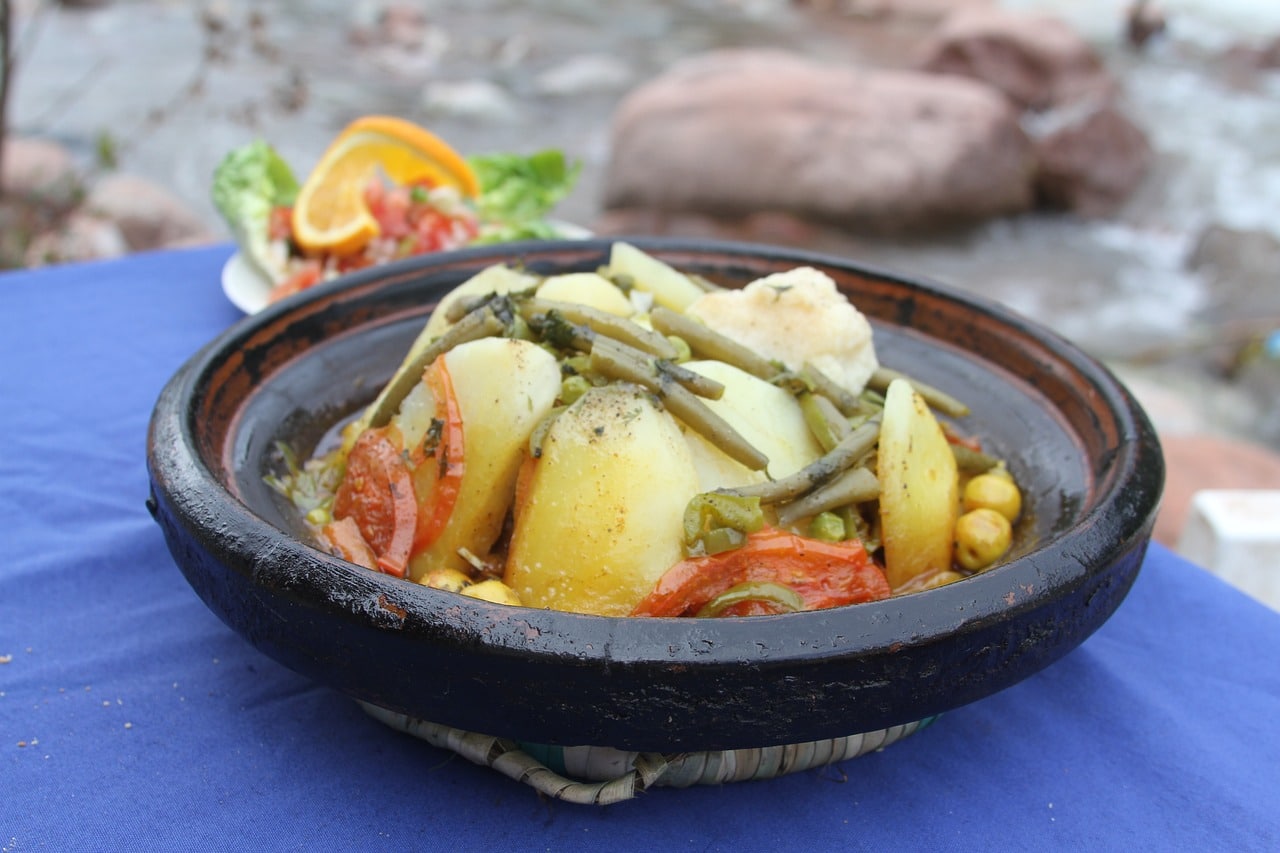Moroccan cuisine: a culinary journey

Moroccan cuisine, a melting pot of rich flavors and diverse traditions, provides an unforgettable culinary journey. The Moroccan palette is a vibrant blend of Berber, Arabic, Andalusian, and Mediterranean cuisines with a dash of European influence. A journey through Moroccan cuisine is like taking a journey through Moroccan history, culture, and society. It’s an experience that touches every sense – the taste, the smell, the sight, and the touch of succulent tagines, fluffy couscous, flavorful pastries, and aromatic spices from Morocco’s bustling souks.
A Taste of Morocco: Traditional Moroccan Dishes
Diving into the Moroccan culinary scene, you’ll encounter a variety of dishes that capture the essence of the Moroccan tradition. For starters, the country’s national dish: couscous. Traditionally served on Fridays, this iconic dish comes steamed to perfection atop a stew of vegetables and meat. It’s a family dish, meant to gather everyone around the table for shared enjoyment.
Avez-vous vu cela : Recipes for traditional dishes with a modern twist
Next, the Moroccan tagine, named after the cone-shaped terracotta pot it’s cooked in, stands as a testament to the magic of slow-cooking. The tagine stew can be a blend of tender meat, poultry, or fish, combined with a variety of fruits, vegetables, and spices. Each tagine dish, whether it be Chicken Tagine with Preserved Lemons and Olives or Lamb Tagine with Prunes and Almonds, promises a unique flavor profile.
Last but not least, Morocco’s soup, Harira, is a hearty blend of lentils, chickpeas, tomatoes, and meat, seasoned with a mix of unique Moroccan spices. It’s traditionally served to break the fast during the holy month of Ramadan.
A lire en complément : Discovering the flavors of Russian cuisine
Morocco’s Spice Souk: An Explosion of Flavors
No culinary journey in Morocco is complete without a visit to a traditional Moroccan spice souk. It’s where Morocco’s culinary heart beats. The air is thick with the scent of spices, from the sweet aroma of cinnamon to the heat of cayenne and the unusual scent of ras el hanout, a classic Moroccan spice blend.
These markets are an integral part of Moroccan society, not just for their role in the culinary arts, but also for their medicinal properties. Many spices, such as turmeric and cumin, are used in traditional Moroccan medicine.
Moroccan Cuisine in Cookbook Literature
For those unable to make the physical journey to Morocco, numerous books can transport the culinary wonders of Moroccan cuisine to your kitchen. These cookbooks provide a comprehensive guide to Moroccan cooking, from traditional recipes to modern interpretations of classic Moroccan dishes. They offer step-by-step instructions, accompanied by stunning photos that serve as a visual guide to the culinary journey.
A best seller in this domain is “The Food of Morocco” by Paula Wolfert. An ISBN search will help you locate this hardcover gem, which has become a must-have in many kitchens. Its excellent condition and rave reviews make it a worthy purchase.
Shipping Moroccan Goodness Worldwide
The good news is that it’s no longer necessary to travel to Morocco for a taste of its cuisine. Thanks to online seller platforms, a variety of Moroccan foodstuffs and ingredients are only a click away. From the United States to Europe and beyond, Moroccan culinary delights are being shipped across continents.
Whether it’s a jar of preserved lemons, a box of rich Moroccan dates, a bag of couscous, or a traditional tagine pot, you can now recreate authentic Moroccan dishes at home. It’s worth noting there could be shipping charges, and delivery times will vary depending on the location.
Moroccan Cuisine: A Journey of Learning and Cooking
Embarking on a Moroccan culinary journey is not just about tasting and enjoying the food. It’s also about learning the art of Moroccan cooking. Cooking classes are particularly popular among tourists, where a local chef guides you through the process of preparing an authentic Moroccan meal. However, thanks to technology, you can also find numerous online courses and YouTube videos dedicated to Moroccan cooking.
In these classes, you will learn about the importance of fresh ingredients, the careful layering of flavors, and the role of slow cooking in Moroccan cuisine. Recipes are handed down from generation to generation, and each chef may add their personal touch, offering a unique culinary experience. With time and practice, you can master the art of Moroccan cooking and enjoy a piece of Morocco in your home.
Remember, Moroccan cuisine is not just about food, it’s about the experience. It highlights a culture rich in history and diversity, and each dish tells a story of its people and their traditions. So, whether you’re journeying to Morocco or exploring its cuisine from the comfort of your home, immerse yourself in the experience, savor each bite, and let the flavors transport you to the heart of Morocco.
Street Food in Morocco: An Adventure for Food Lovers
Exploring street food in Morocco is a thrilling adventure for any food lover. A wander down the busy streets and narrow alleys can lead you to a variety of mouth-watering delicacies, offering a taste of authentic Moroccan cuisine. The sizzling sound of skewers on the grill, the aroma of freshly baked bread, the sight of colorful salads and pickles, all combine to create an irresistible draw for both locals and tourists.
One of the most popular street foods in Morocco is B’stilla, a flaky pastry filled with pigeon meat, almonds, and a blend of Moroccan spices, then dusted with sugar and cinnamon. It’s a delightful fusion of savory and sweet flavors. Another must-try is Merguez, a spicy lamb sausage, often served in a baguette with a side of harissa sauce.
For seafood lovers, the coastal cities of Morocco offer an array of sumptuous dishes. From freshly grilled sardines in Essaouira to a variety of fish tagines in Agadir, the Moroccan coastal cuisine is a seafood lover’s paradise.
Street food in Morocco also caters to those with a sweet tooth. The Moroccan donut, Sfenj, made from unsweetened yeast dough and deep-fried until golden, is a popular choice. Another crowd-pleaser is Maakouda, a deep-fried potato cake often enjoyed with a cup of Moroccan mint tea.
Exploring street food in Morocco is not just a culinary journey, but a journey of discovery into the heart of Moroccan culture. It showcases the skills of Moroccan street vendors and their ability to create delicious, affordable meals using simple ingredients and traditional cooking methods.
Moroccan Cuisine in Global Gastronomy
The influence of Moroccan cuisine on global gastronomy is undeniable. Its rich flavors, diversity, and unique cooking methods have made it a favorite among food lovers worldwide. Chefs from different countries, inspired by Moroccan culinary arts, have incorporated elements of Moroccan cuisine into their recipes, creating fusion dishes that are as delicious as they are innovative.
Cookbook authors like Ghillie Basan and Jeff Koehler have helped to popularize Moroccan cuisine. Their books, such as ‘Morocco: A Culinary Journey’ and ‘Morocco: Delicious Recipes from North Africa’, provide an insight into the Moroccan culinary scene. These books, filled with stunning photos and delicious recipes, have received high ratings and reviews, earning them a place in the lovers collection of many food enthusiasts.
In addition, Moroccan cuisine has been featured in numerous food travel shows, demonstrating the country’s potential as a culinary destination. Food markets in Marrakech have become popular tourist attractions, with chefs and food lovers flocking to experience the vibrant food culture.
Whether you’re planning a trip to Morocco or simply want to try your hand at Moroccan cooking, you can embark on this culinary journey and discover the diverse flavors and traditions of Moroccan cuisine.
Conclusion
To conclude, Moroccan cuisine is a culinary journey that one should not miss. The diversity and richness of Moroccan dishes, from traditional fare to street food, offer an authentic taste of Moroccan culture. Beyond its delicious food, Moroccan cuisine also represents a way of life, a history, and a culture that values hospitality, togetherness, and sharing.
Whether you’re exploring the bustling markets of Marrakech, attending a cooking class, or reading a cookbook by Ghillie Basan or Jeff Koehler, Moroccan cuisine provides endless opportunities for discovery and learning. For food lovers, a culinary journey to Morocco is an experience worth cherishing, one that leaves you with a deep appreciation for Moroccan food and its people.
So, whether you’re a seasoned chef or an adventurous foodie, immerse yourself in the world of Moroccan cuisine. Let the journey of discovery take you to the heart of Morocco, and let the love for Moroccan food grow in your heart. Savor each bite, experience, and memory, and let it be a journey you remember fondly. Let Moroccan cuisine be more than just food – let it be a culinary journey full of love, warmth, and joy.
